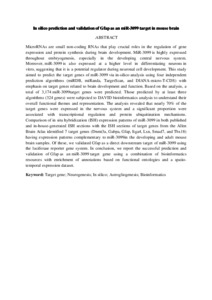Citation
Zainal Abidin, Shahidee and Leong, Jia Wen and Mahmoudi, Marzieh and Nordin, Norshariza and Abdullah, Syahrilnizam and Cheah, Pike See and Ling, King Hwa
(2017)
In silico prediction and validation of Gfap as miR-3099 target in the mouse brain.
Neuroscience Bulletin, 33 (4).
373 - 382.
ISSN 1673-7067; ESSN: 1995-8218
Abstract
MicroRNAs are small non-coding RNAs that play crucial roles in the regulation of gene expression and protein synthesis during brain development. MiR-3099 is highly expressed throughout embryogenesis, especially in the developing central nervous system. Moreover, miR-3099 is also expressed at a higher level in differentiating neurons in vitro, suggesting that it is a potential regulator during neuronal cell development. This study aimed to predict the target genes of miR-3099 via in-silico analysis using four independent prediction algorithms (miRDB, miRanda, TargetScan, and DIANA-micro-T-CDS) with emphasis on target genes related to brain development and function. Based on the analysis, a total of 3,174 miR-3099 target genes were predicted. Those predicted by at least three algorithms (324 genes) were subjected to DAVID bioinformatics analysis to understand their overall functional themes and representation. The analysis revealed that nearly 70% of the target genes were expressed in the nervous system and a significant proportion were associated with transcriptional regulation and protein ubiquitination mechanisms. Comparison of in situ hybridization (ISH) expression patterns of miR-3099 in both published and in-house-generated ISH sections with the ISH sections of target genes from the Allen Brain Atlas identified 7 target genes (Dnmt3a, Gabpa, Gfap, Itga4, Lxn, Smad7, and Tbx18) having expression patterns complementary to miR-3099 in the developing and adult mouse brain samples. Of these, we validated Gfap as a direct downstream target of miR-3099 using the luciferase reporter gene system. In conclusion, we report the successful prediction and validation of Gfap as an miR-3099 target gene using a combination of bioinformatics resources with enrichment of annotations based on functional ontologies and a spatio-temporal expression dataset.
Download File
![[img]](http://psasir.upm.edu.my/62129/1.hassmallThumbnailVersion/In%20silico%20prediction%20and%20validation%20of%20Gfap%20as%20an%20miR-3099%20target%20in%20mouse%20brain.pdf)  Preview |
|
Text
In silico prediction and validation of Gfap as an miR-3099 target in mouse brain.pdf
Download (85kB)
| Preview
|
|
Additional Metadata
Actions (login required)
 |
View Item |

